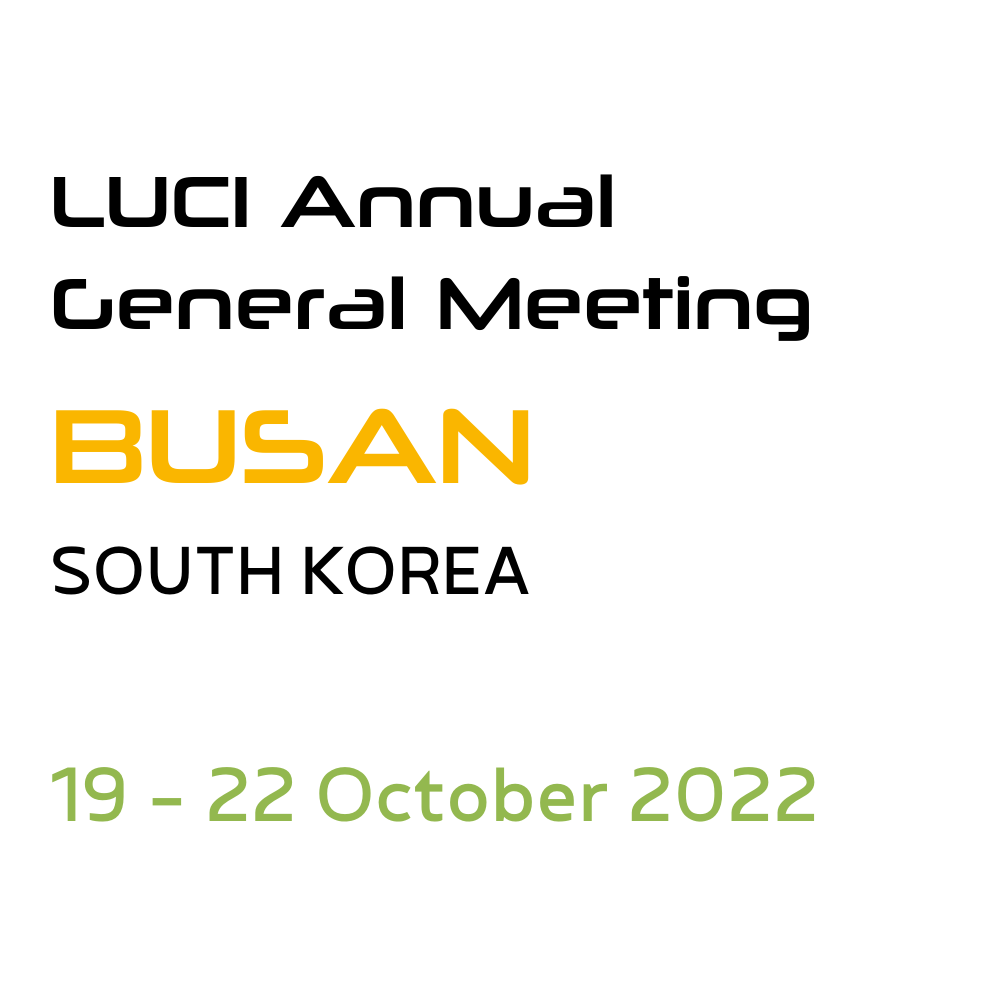Programme details (topics, speakers, timing…) are subject to change. Please check back for updates.
Open Conference Sessions
The LUCI Open Conference Sessions give LUCI members the opportunity to showcase their city’s lighting strategy, projects and other initiatives, or discuss a topic of their choice, in a unique international forum. Organised in parallel tracks, each presentation session will last approximately 15 minutes with a live Q&A at the end of three sessions.
Track 1:
- “The present and future of urban lighting in Jinju” – Yejin Kim, Housing and Landscape Division, City of Jinju
Jinju is an educational and cultural city with a long history and is an urban and rural complex city with various cultural heritages. Jinju has established a master plan for the night view and is doing its best to systematically manage urban lighting and organise beautiful designs. The night view master plan
aims for four key strategies: “Impressive Jinju,” “Beautiful Jinju,” “Happy Jinju,” and “Safe Living Space.”
Based on this, the lighting landscape in Jinju City made the night view of the city beautiful and functional so that citizens can enjoy night lighting conveniently and safely. Based on the night view master plan, Jinju is continuously making efforts to increase the value of the city brand and connect the existing and newly installed lights.
- “Green Space Dark Skies – lighting up the landscape” – Liz Pugh, Creative Producer, Walk the Plank/Salford
Green Space Dark Skies is one of the UK’s most groundbreaking projects of 2022. Commissoned for Unboxed 2022: Celebrating creativity across the UK, the project has engaged thousands of citizens to make journeys into national parks and other wild spaces to connect with nature through light, in order to encourage more people to be better guardians for our planet.
Using geopositioning light technology and human beings, artists from Walk the Plank, working with Siemens and the National Parks UK – have animated iconic landscapes in Scotland, Wales, Ireland and England – from Neolithic stone circles to the Giants Causeway. Liz will share her experience of working with light to engage participants – from the lanterns Walk the Plank made for last year’s AGM in Tartu to the geolights of this project – and discuss how to engineer engaging projects with light.
- “Darkness is a positive tool: Inclusive lighting planning in Helsinki” – Marjut Kauppinen, Head of Public Lighting, City of Helsinki
Helsinki is developing various means to get lighting related feedback and initiatives from inhabitants. Youth, feeling of safety and security, accessibility in urban environment and nearby nature, the need for dark areas, mixed modes of transport in existing urban space – all these themes need active and open dialogue between city officials, decision makers and city residents. Participatory budgeting gives residents opportunities to evaluate their lighting needs and wishes vs. the amount of resources. Public surveys are used in specific themes: e.g. how to find out the most disturbing or most pleasant urban night time views (Helsinki Obtrusive Lighting Survey 2021).
- “Raising awareness of light & art in public spaces” – Frédéric Durand, Head of the Studies Department, Urban Lighting Department, City of Lyon (FR) and Mark Burton-Page, General Director, LUCI Association
The LAIPS project (Light & Art in Public Spaces), a Creative Europe funded project, aims to strengthen city capacities on permanent light art installations in public spaces by exchanging best practices, fostering transnational cooperation among cities, and making use of innovative digital tools. Launched in 2021 between LUCI Association and the project partners (City of Lyon, City of Oulu, and City of Turin), the project has made major headways with two Light & Art Lab visits and the development of a Progressive Web App to raise awareness about light art in cities and make these light art works more accessible to professionals and the wider public.
- “Madiun Regency Urban Lights Plan” – H. Hari Wuryanto, Vice Regent, Madiun Regency
The Madiun Regency Government has a strategic plan to build a safe Smart City. Smart Street Lighting is the first major step within this vision, which also supports the Indonesian Government’s commitment to implement energy efficiency and reduce carbon emissions. Street lighting that meets standards and is equipped with smart system technology will have a greater positive impact in creating a sense of security, increasing road safety, providing longer economic activity at night. The Madiun team will present the Public-Private Partnership scheme that will begin operating in mid-2023, the City Square Night Beautification program and also discuss the K-City Network program where smart sensors will be installed on the street lighting poles.
Track 2:
- “The Lighting Master Plan and dark infrastructure of Qiantang River” – Roger Narboni, Lighting Designer, Concepto
In 2018, the Chinese authority in charge of the Qiantang River’s development launched a study to imagine a lighting strategy for the whole Qiantang River territory where the river covers 250 km, passing through 5 large cities including the provincial capital Hangzhou, before flowing into the East China Sea.
This presentation will review what inspired the creation of the lighting masterplan for this area. The lighting strategy was then based on two levels: the scale of the public and the large landscape scale to give accurate answers to this very large and complex territory. In addition, the lighting strategy
was based on an ecological approach, to protect the environment and the nocturnal biodiversity with the ambition to balance light and darkness along the river’s territory, creating a unique and innovative River Nightscape to lead the city into the future.
- “Rabat’s lighting strategy” – Hassan Tatou, Vice Mayor, City of Rabat
This session will present the advances and progress made by the City of Rabat in terms of energy efficiency and public lighting management. It will also mention the intentions and future planning in this field, especially the ambitious development programme “Rabat City of Light, Cultural Capital of
Morocco,” initiated by HM King Mohamed VI, and which aspires to make the green city and world heritage site of Rabat a model to follow in terms of sustainable development.
- “Leipzig’s Festival of Lights” – Heike Besier, Urban Planner, City Planning Office, City of Leipzig
The presentation is about Leipzig’s “Festival of Lights” and the historical background of this festival. For the 2024 edition of this Festival, we are looking for projects that artistically take up the theme along Leipzig’s inner city ring road, reflect it in the current context and make it an emotional experience.
Calling “We are the people” and “No violence”, around 70 000 people gathered on October 9, 1989, to march along Leipzig’s inner city ring road, demonstrating for freedom and democracy and thus paving the way for the fall of the Wall, for the unity of Germany and Europe. Annually, the Festival of Lights takes place on the 9th of October in order to keep the memories of the Peaceful Revolution alive. For the 2024 edition of this Festival, the city is looking for projects that artistically take up the theme along Leipzig’s inner city ring road, reflect it in the current context and make it an emotional experience.
- “Sustainability in Urban Lighting and Smart Lighting Options” – Alex Huang, Head of Professional Sales, Louis Poulsen Asia
Cities are facing growing challenges in terms of public urban lighting, including luminaire obsolescence, maintenance challenges, upgrading existing installations and future-proofing. This presentation will share examples of projects in Singapore and Adelaide, showcasing solutions that address these issues and offer options for smart lighting management. The sustainability approach from concept design to end of product lifecycle will also be covered.




